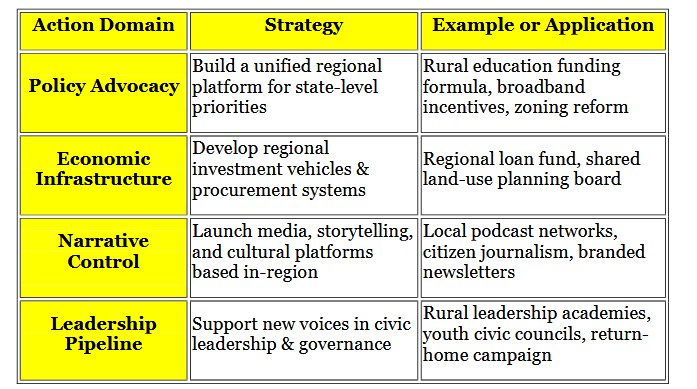The Foothills Corridor - Chapter 24: Reclaiming Control from Charlotte and Raleigh
Chapter 24: Reclaiming Control from Charlotte and Raleigh
For decades, the narrative—and the capital—have flowed east and south. Charlotte and Raleigh have dominated political agendas, media attention, and economic development pipelines. The Foothills Corridor has often been treated as an afterthought: too rural to prioritize, too fragmented to organize, too slow to invest in.
That era must end.
Reclaiming control isn’t about declaring war on the metros. It’s about asserting strategic independence. It’s about building a power base that no longer waits to be invited to the table, because it has started building its own. Control isn’t demanded—it’s constructed, step by step, until it can't be ignored.
The Cost of Dependence
When everything flows through Charlotte and Raleigh:
· Regional infrastructure gets delayed or downsized.
· Economic development policies prioritize mega-projects over rural realities.
· Local needs are filtered through urban assumptions.
· Rural institutions are left begging for relevance.
Even well-meaning efforts fall short when they’re designed in cities for problems they don’t fully understand. The Foothills doesn’t need trickle-down innovation. It needs control over its own priorities.
What Reclaiming Control Looks Like
1. Policy Advocacy with Teeth
The region must speak with a unified voice to state government—pushing for funding formulas, regulatory changes, and legislative agendas that reflect rural needs. That means forming alliances, training advocates, and showing up with data.
2. Regional Economic Development Capacity
Rather than competing for crumbs from urban-led initiatives, the Corridor must build its own deal flow, venture networks, and land-use strategies. That includes:
· Pooled marketing.
· Shared industrial site development.
· Coordinated grant-writing teams.
3. Media Narratives Owned Locally
Too often, stories about the region are filtered through Charlotte or Raleigh journalists. The Corridor needs its own media outlets, podcast networks, data dashboards, and storytelling platforms. Perception drives investment—and right now, perception is still imported.
4. Cultural and Political Assertiveness
The Foothills isn’t a cultural offshoot of the Triangle or the Queen City. It has its own values, identity, and historical legacy. That needs to show up in public policy, regional branding, and leadership recruitment.
This doesn’t mean isolation. It means self-determination.
The Risk of Playing Small
If the Corridor continues to define itself by its relationship to Charlotte and Raleigh, it will always be reactive. Always in competition for leftover attention. Always behind the curve.
By building its own gravity, the region can flip the script: urban policymakers, funders, and employers will start asking how they can be part of what’s happening here, not the other way around.
Where to Begin
· Convene a Foothills Regional Assembly—a standing body to coordinate rural policy and planning.
· Commission a Rural Autonomy Index—tracking how much of the region’s capital, talent, and influence is homegrown vs. imported.
· Launch a “Lead from Here” campaign—recruiting and supporting local candidates, entrepreneurs, and cultural producers.
Why It Matters
Charlotte and Raleigh will continue to grow. But the Foothills doesn’t need to ride their coattails. It needs to chart its own course—and insist on partnership, not patronage.
Reclaiming control means deciding what matters, how it gets funded, and who tells the story.
This isn’t a rebellion. It’s a return to roots. And the first act of regional power is believing you deserve it.
The central barrier facing the Foothills Corridor isn’t just economic—it’s structural disempowerment. For decades, Charlotte and Raleigh have concentrated political influence, philanthropic capital, and media attention, while regions like ours have been treated as footnotes or feedstock. We’re not just underrepresented. We’re systematically excluded.
Waiting for recognition won’t change that. Control has to be reclaimed—not requested. But that starts with hard, local decisions. Too many Foothills communities still act like satellites—looking to Raleigh for policy, Charlotte for capital, and Washington for permission. The result is dependency, not leverage.
To flip this script, the Corridor needs to coordinate at a scale large enough to demand attention. That means creating regional advocacy coalitions, pooling legal resources, and establishing think-tank-style entities that produce serious policy alternatives—not just complaints.
It also means learning to speak the language of power. That includes data fluency, media strategy, and the ability to frame issues in economic, not just moral, terms. Raleigh responds to workforce. Charlotte responds to ROI. If we want to move them, we must outthink them.
No one’s going to hand us control. But we can take it—by building regional consensus, creating our own narrative engines, and putting enough political pressure on the system to make ignoring us the riskier move.



